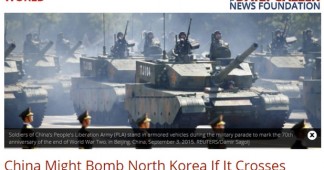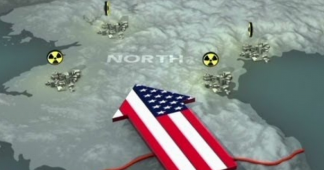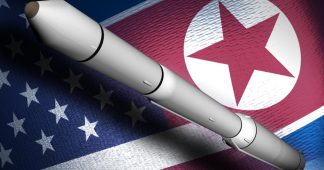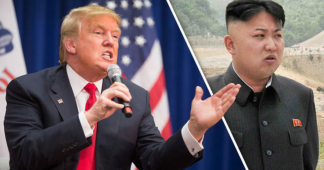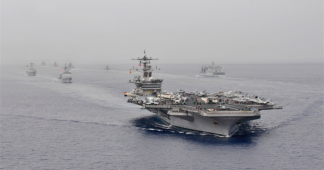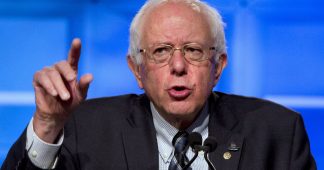By Alexander Mercouris
Editorial in Chinese official newspaper Global Times sets out China’s red lines: China will intervene in event of US invasion of North Korea to prevent regime change there
As the war of words between the US and North Korea continues to mount, an increasingly angry and worried China has given Washington and Pyongyang a clear public hint of where its red lines are.
The hint came in an editorial in Global Times, a newspaper owned by the Chinese Communist Party’s official newspaper the People’s Daily, which is often used by the Chinese government to express opinions it holds but which it feels it might be too provocative to air officially.
Editorials in Global Times do not therefore have quite the same weight as editorials in the People’s Daily or the official Xinhua news agency or of course public statements by the Chinese government. However they do reflect official Chinese thinking and should be read as such, especially since their wording is carefully chosen in advance.
The editorial in Global Times in which China has hinted at its red lines downplays the risk of war. It says the angry rhetoric Washington and Pyongyang are hurling at each other is foolish grandstanding. About that it is almost certainly. However it also says that this grandstanding risks war because both sides risk humiliation if they back down
Many people believe the possibility of war is very low. If war really breaks out, the US can hardly reap any strategic harvest and North Korea will face unprecedented risks. North Korea aims to propel the US to negotiate with it, while the US wants to put North Korea in check. Neither can achieve its goal, so they compete to escalate tensions, but neither wants to take the initiative to launch a war.
The real danger is that such a reckless game may lead to miscalculations and a strategic “war.” That is to say, neither Washington nor Pyongyang really wants war, but a war could break out anyway as they do not have the experience of putting such an extreme game under control.
Yesterday in an article for The Duran I said that China’s patience with the US was almost exhausted and the Global Times editorial straightforwardly says this, putting the US on the same level of childishness as North Korea and saying that China has given up hope of persuading these two countries to start behaving like grown-ups. It says that in light of this “reckless” behaviour by both sides – with the greater onus to behave responsibly being however first and foremost on the US since it is by far the stronger party – China is obliged to make clear to both sides what its red lines are
Beijing is not able to persuade Washington or Pyongyang to back down at this time. It needs to make clear its stance to all sides and make them understand that when their actions jeopardize China’s interests, China will respond with a firm hand.
Then comes the clear statement of what the red lines are, and what in the event of armed conflict China will do
China should also make clear that if North Korea launches missiles that threaten US soil first and the US retaliates, China will stay neutral. If the US and South Korea carry out strikes and try to overthrow the North Korean regime and change the political pattern of the Korean Peninsula, China will prevent them from doing so.
In other words if North Korea is so stupid as to launch an unprovoked attack on the US – which in this context probably covers the wild and reckless North Korean threat to launch a missile demonstration against Guam – it is on its own. However if the US attacks North Korea – either as part of some ‘pre-emptive’ strategy or in order to achieve regime change there, China will come to North Korea’s defence.
The Global Times editorial – wisely – does not spell out what China would in that case do. However since the discussion is one of war the necessary implication must be that in the event of a US attack on North Korea China will respond militarily.
Probably that response will be graduated and will depend on how severe the US attack on North Korea might be. However since the editorial says that the survival of the North Korea is a matter of Chinese national interest, the necessary implication must be that in the event of a straightforward US-South Korean invasion of North Korea to achieve regime change there the Chinese response would be direct intervention by the Chinese armed forces to prevent that happening.
That would set the scene for the first armed clash between the US and the Chinese militaries since the end of the Korean war, and for the first all-out military superpower clash since the end of the Second World War.
I have repeatedly written in The Duran that bluffing China is a fool’s game because such a bluff in the end is always called.
The previous threats made by the Trump administration against North Korea – and indirectly against China – in April, far from scaring China into siding with the US by imposing comprehensive sanctions – ie. an economic blockade – on North Korea, led instead to China demanding that the US cease its military exercises in South Korea and open direct talks with Kim Jong-un’s government in Pyongyang.
Now what the latest US threats have managed to do is make China give its first public hint of a Chinese security guarantee to North Korea, with a public statement that in the event of a US attempt to overthrow Kim Jong-un by force China will come to his defence.
This comes with a statement that China sees the survival of North Korea as a Chinese national interest.
On 20th August 1950 Chinese Prime Minister Zhou Enlai warned the US through diplomatic channels that China would intervene in the Korean war unless the US backed off from its invasion of North Korea. His words allegedly were
Korea is China’s neighbour … The Chinese people cannot but be concerned about a solution of the Korean question
US President Truman dismissed Zhou Enlai’s warning, calling it a bluff.
The result was that when the Chinese military did intervene in the Korean Peninsula against the US in October 1950 it came as a total surprise, leading to a military debacle in which outright disaster was only narrowly avoided.
It is to be hoped that this time – when China is immeasurably more powerful than it was in 1950, and when – because of the spread of nuclear weapons – the stakes are so much greater – the US pays more attention to China’s warning.
Should it fail to do so then the disaster which would threaten it – and the world – would be immeasurably greater than the one it only narrowly avoided in 1950.
